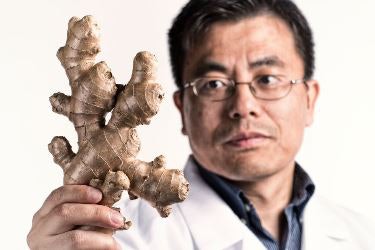A prolific scholar and 2015 winner of the Research Article of the Year award from the Journal of Agricultural and Food Chemistry, Dr. Shengmin Sang is helping to position historically Black North Carolina A&T State University (N.C. A&T) into a center of cutting-edge cancer research.
 Dr. Shengmin Sang
Dr. Shengmin Sang
As a reviewer for more than two dozen scholarly journals and owner of four U.S. patents with applications pending for an additional two, Sang is a highly accomplished scientist.
But perhaps his most significant achievement to date is his latest patent for a family of aspirin-derived compounds that may prove useful in treating or preventing colon cancer, heart disease and other disorders.
“Recently, clinical studies have shown that low-dose aspirin can prevent cancer, especially colorectal cancer,” Sang explains in an interview with Diverse.
“But long-term aspirin use can cause GI tract ulceration and bleeding, and because of that limitation we are trying to develop a new aspirin derivative, an aspirin alternative.”
In addition to preventing cancer, Sang says, “We think this could be helpful in treating anything for which aspirin is recommended for treatment or prevention. We found our new compound to be less toxic to the stomach than aspirin.”
In announcing the patent, N.C. A&T stated in a news release that it could mean “more patients may one day be able to receive the benefits of aspirin without incurring adverse side effects.”
Sang points out that he is part of a research group at the North Carolina Research Campus that studies agriculture and nutrition-related topics and that, in addition to the approved patent, his group has filed “a continuation patent that is under review.”
The patent award comes after publication of the study, “Novel Resveratrol-based Aspirin Prodrugs: Synthesis, Metabolism and Anticancer Activity,” which Sang co-authored with six other researchers and was published last July in the Journal of Medicinal Chemistry.
“Dr. Sang’s work exemplifies our commitment to researching natural treatments and functional foods for human health and animal health, which is core to our missions,” Dr. Shirley Hymon-Parker, interim dean of the School of Agriculture and Environmental Sciences at N.C. A&T, tells Diverse. “Dr. Sang’s patent for this research advances our course to improve the health and well-being of our citizens.”
A native of China with a Ph.D. in organic chemistry from the Shanghai Institute of Materia Medica, Chinese Academy of Sciences, Sang received his postdoctoral training at Rutgers University.
Sang is a ubiquitous figure in North Carolina academia. He is a tenured associate professor and lead scientist for functional foods at the N.C. A&T North Carolina Research Campus, a full-time faculty member at the University of North Carolina Lineberger Comprehensive Cancer Center and an adjunct associate professor at North Carolina State University.
He notes that much of his work has been funded through grants from the National Institutes of Health, the U.S. Department of Agriculture, the North Carolina Biotechnology Center and the private sector, as well as funding from the Qatar National Research Fund for a collaborative project with faculty at Qatar University. “We’re trying to use all the resources available to move our research forward,” Sang says, adding that he and his colleagues are “in the process of working with a company to license our patent.”
Sang is active not only in cancer prevention research, but he also researches how wheat bran, tea, ginger and other foods can be beneficial in preventing or treating chronic and inflammatory diseases such as cancer, diabetes and obesity, and has co-authored numerous articles on the benefits of these foods. He also teaches food and nutrition courses at N.C. A&T and N.C. State.Sang suggests that his teaching and study of functional foods is not only contributing to public health interests, but to his own.
Asked if he applies his research findings to his own diet, Sang responds with a laugh.
“I’m trying to live a healthy lifestyle so I drink black tea because it contains lots of antioxidants and I also drink green tea and ginger tea. And I eat healthy food and don’t eat junk food. … Well, occasionally junk food is no problem, but I try to avoid it.”















